
views
Passing a Substance Test
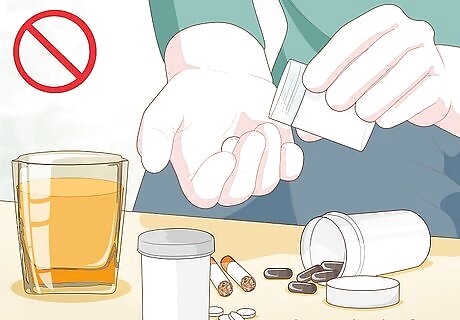
Stop all drug use at least 2 weeks before your assessment. Even if you are being assessed for alcohol abuse, you may be tested for other drugs as well. It is very important that you go in to your assessment completely clean. Most drugs leave your system within 2 weeks, but others, such as marijuana and some types of depressant, take longer when used frequently. It’s best to stop any drug use as soon as your assessment is ordered.

Stop drinking for at least a full day before your assessment. The earlier you can stop drinking, the better. However, at the very least you should stop all alcohol intake at least 12 hours before your assessment in order to give it time to leave your system.
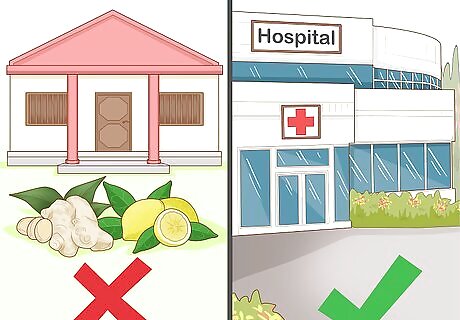
Avoid detoxing from heavy alcohol use at home. If you feel you need to detox from alcohol, it is better to seek out a professional who can guide you through the process. Detoxing at home is often unsuccessful and may even be dangerous. If stopping or cutting back on alcohol use leads to physical symptoms such as tremors, you may have a chemical dependency on alcohol. If you are worried about experiencing withdrawal or have experienced it in the past when reducing your drinking, you may need to seek professional help before passing an assessment.

Refrain from consuming anything that will create a false positive. Poppy seeds and decongestants (ephedrine) are 2 commonly consumed substances that can create false positives on certain types of drug tests. To be on the safe side, avoid these things for at least a few days before your assessment. It’s also a good idea to have written documentation of any medications you are on.
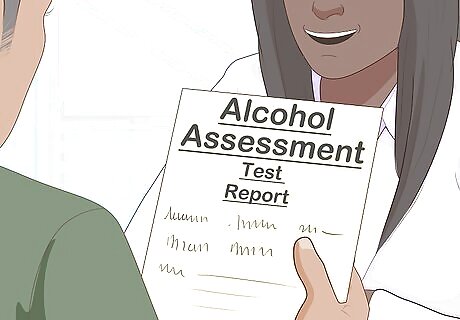
Request a second opinion if you believe the results are false. It’s unlikely, but in some cases your substance test may not be accurate. Many states allow you to request an independent second opinion, although you may have to pay for it yourself.
Answering Questions During Your Assessment
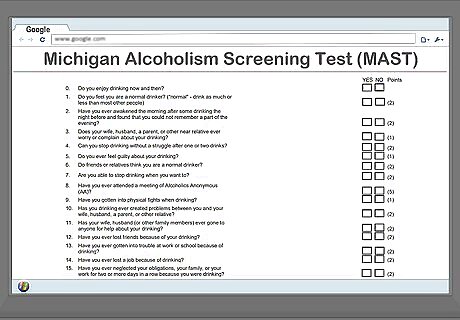
Look up sample questions online beforehand. It can be helpful to have some idea of what to expect when you go in for your assessment. There are several online self-evaluation quizzes for alcohol assessment. Take a few and prepare some answers to likely questions. The two most common alcohol self-assessment quizzes are the Michigan Alcohol Screen Test (MAST) and the Alcohol Use Disorders Identification Test (AUDIT). Questions will most likely focus on the frequency and circumstances of your drinking, your history of alcohol use, and how your drinking affects your obligations and those close to you.

Consult an attorney before your assessment. It’s a good idea to talk to an attorney with experience in alcohol assessments before you go in. They will be able to offer you guidance on what to expect and how best to answer the questions. Most states have online directories of legal services that provide free counsel if you can’t afford to hire an attorney.

Know who your references will be and talk to them ahead of time. In most alcohol assessments, 2-3 people close to you will be interviewed about your alcohol use and general conduct. Choose people who know you well and can give honest, positive accounts. If they were involved in any situation that led to your assessment, make sure you agree on the details of the situation. In some cases, the contacts may be chosen for you. Be aware that they are likely to be people close to you in your work, home, and social life.

Give brief, straight-forward answers. It may be tempting to give elaborate answers to the questions you are asked, but the fewer details you give, the better. Giving brief answers will also help your assessment progress faster.

Be honest. Lying or bending the truth in an alcohol assessment can actually make your situation worse if you are found out. Dishonesty is considered a very likely indication of substance abuse and will not sway the assessment in your favor. It’s also better for you in the long run, as well as those close to you, to be honest about your relationship with your alcohol and receive help if you genuinely need it.
Making a Good Impression

Stop drinking as soon as possible. Even if your assessment won’t take place for several days or weeks after your initial sentencing, it’s a good idea to quit drinking or cut back significantly until your assessment. If you do drink, stay at home. Judges, counselors, and other professionals involved in your case may find out if you are drinking excessively in public.

Arrive on time. This will show that you are responsible, and also convey respect for the people involved in your assessment. Double check that you know when the assessment is scheduled to occur, and leave yourself plenty of time to get there without rushing.
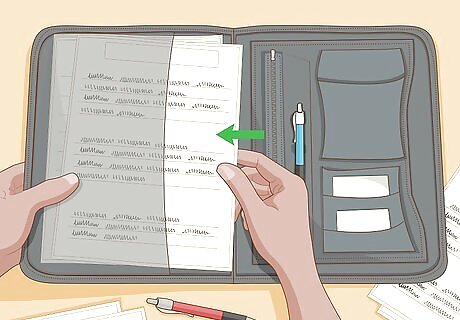
Gather any necessary documents before your assessment. You should be informed of what documents you will need to present at your assessment. This may include offense-related documents such as tickets, driving records, incident reports, or probation papers.

Wear clean, professional clothes to your assessment. While a suit and tie isn’t necessary, it’s important to wear appropriate attire when you go in for your assessment. Make sure what you’re wearing is modest and free of stains, wrinkles, or tears. A button-up shirt and slacks or a knee-length skirt are good choices.

Be respectful to everyone you interact with during your assessment. You may feel it’s unfair that you have to go through this assessment, or it may be an inconvenience for you, but you will get the best results by acting polite and respectful. Be positive and professional, and treat everyone you speak to courteously throughout your assessment.




















Comments
0 comment